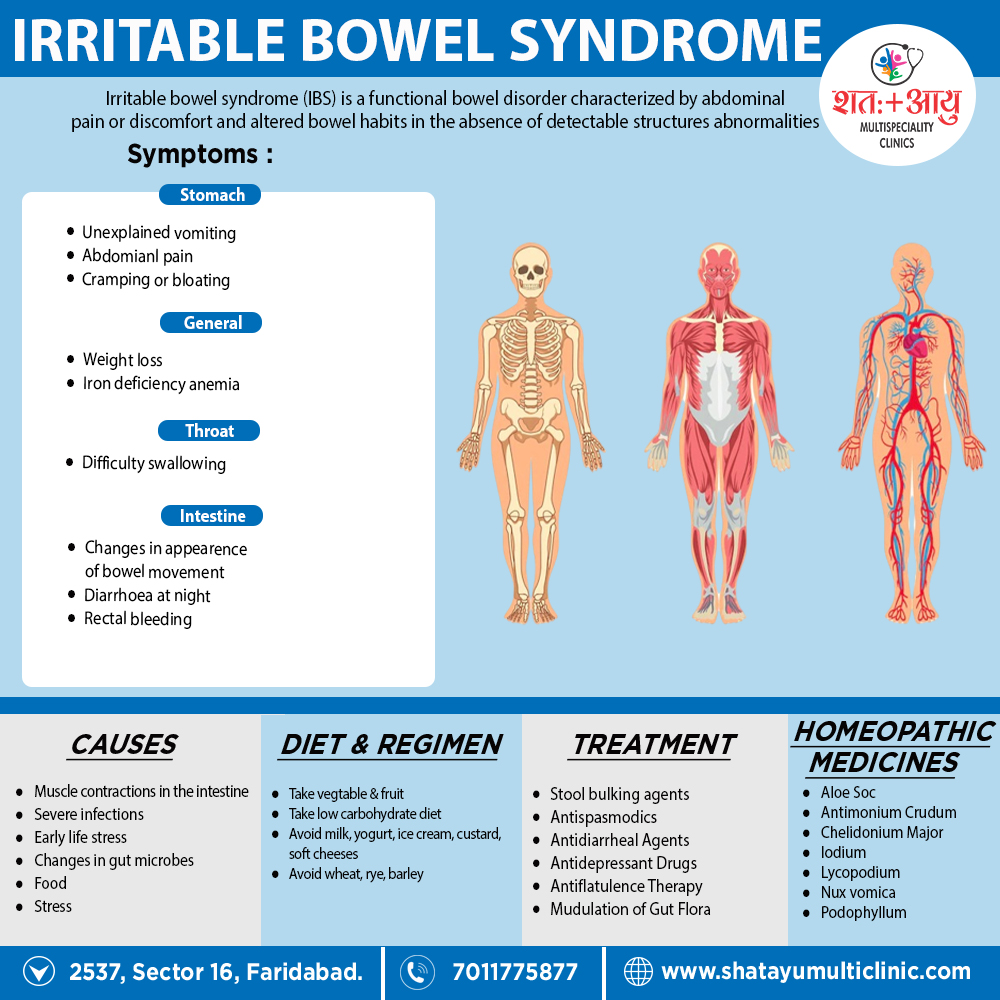Definition of Irritable bowel syndrome
Irritable bowel syndrome (IBS) is a functional bowel disorder characterized by abdominal pain or discomfort and altered bowel habits in the absence of detectable structural abnormalities. [1]

Irritable bowel syndrome (IBS) is a functional bowel disorder characterized by abdominal pain or discomfort and altered bowel habits in the absence of detectable structural abnormalities. [1]
No clear diagnostic markers exist for IBS, thus, the diagnosis of the disorder is based on clinical presentation. In 2006, the Rome II criteria for the diagnosis of IBS were revised.
Moreover, Throughout the world, about 10–20% of adults and adolescents have symptoms consistent with IBS, and most studies show a female predominance.
Severity of symptoms varies and can significantly impair quality of life, resulting in high health care costs. Advances in basic, mechanistic, and clinical investigations have improved our understanding of this disorder and its physiologic and psychosocial determinants. [1]
The precise cause of IBS isn’t known. Factors that appear to play a role include:
The walls of the intestines are lined with layers of muscle that contract as they move food through your digestive tract. Contractions that are stronger and last longer than normal can cause gas, bloating and diarrhea. Weak intestinal contractions can slow food passage and lead to hard, dry stools.
Abnormalities in the nerves in your digestive system may cause you to experience greater than normal discomfort when your abdomen stretches from gas or stool. constipation.
IBS can develop after a severe bout of diarrhoea (gastroenteritis) caused by bacteria or a virus
People exposed to stressful events, especially in childhood, tend to have more symptoms of IBS.
Examples include changes in bacteria, fungi and viruses, which normally reside in the intestines also play a key role in health.
Triggered factors are:
The role of food allergy or intolerance in IBS isn’t fully understood. Additionally, A true food allergy rarely causes IBS.
Most people with IBS experience worse or more-frequent signs and symptoms during periods of increased stress. But while stress may aggravate symptoms, it doesn’t cause them. [2]
Many people have occasional signs and symptoms of IBS. But you’re more likely to have the syndrome if you:
The pathogenesis of IBS is poorly understood, although roles of abnormal gut motor and sensory activity, central neural dysfunction, psychological disturbances, mucosal inflammation, stress, also luminal factors have been proposed. [1]
The signs and symptoms of IBS vary but are usually present for a long time. The most common include:
There’s no test to definitively diagnose IBS. Your doctor is likely to start with a complete medical history, physical exam and tests to rule out other conditions, such as celiac disease.
After other conditions have been ruled out, your doctor is likely to use one of these sets of diagnostic criteria for IBS:
These criteria include abdominal pain and discomfort lasting on average at least one day a week in the last three months, associated with at least two of these factors: Pain and discomfort are related to defecation, the frequency of defecation is altered, or stool consistency is altered.
For the purpose of treatment, IBS can be divided into three types, based on your symptoms: constipation-predominant, diarrhoea-predominant or mixed.
Your doctor will also likely assess whether you have other signs or symptoms that might suggest another, more serious, condition.
If you have these signs or symptoms, or if an initial treatment for IBS doesn’t work, you’ll likely need additional tests. [2]
Homeopathy treats the person as a whole. It means that homeopathic treatment focuses on the patient as a person, as well as his pathological condition. The homeopathic medicines selected after a full individualizing examination and case-analysis.
which includes
A miasmatic tendency (predisposition/susceptibility) also often taken into account for the treatment of chronic conditions.
A homeopathy doctor tries to treat more than just the presenting symptoms. The focus is usually on what caused the disease condition? Why ‘this patient’ is sick ‘this way’?.
The disease diagnosis is important but in homeopathy, the cause of disease not just probed to the level of bacteria and viruses. Other factors like mental, emotional and physical stress that could predispose a person to illness also looked for. No a days, even modern medicine also considers a large number of diseases as psychosomatic. The correct homeopathy remedy tries to correct this disease predisposition.
The focus is not on curing the disease but to cure the person who is sick, to restore the health. If a disease pathology not very advanced, homeopathy remedies do give a hope for cure but even in incurable cases, the quality of life can greatly improved with homeopathic medicines.
The homeopathic remedies (medicines) given below indicate the therapeutic affinity but this is not a complete and definite guide to the homeopathy treatment of this condition. The symptoms listed against each homeopathic remedy may not be directly related to this disease because in homeopathy general symptoms and constitutional indications also taken into account for selecting a remedy.
To ease chronic IBS-associated constipation
If IBS symptoms involve diarrhea,
Irritable bowel syndrome (IBS) is a functional bowel disorder characterized by abdominal pain or discomfort and altered bowel habits in the absence of detectable structural abnormalities.
References